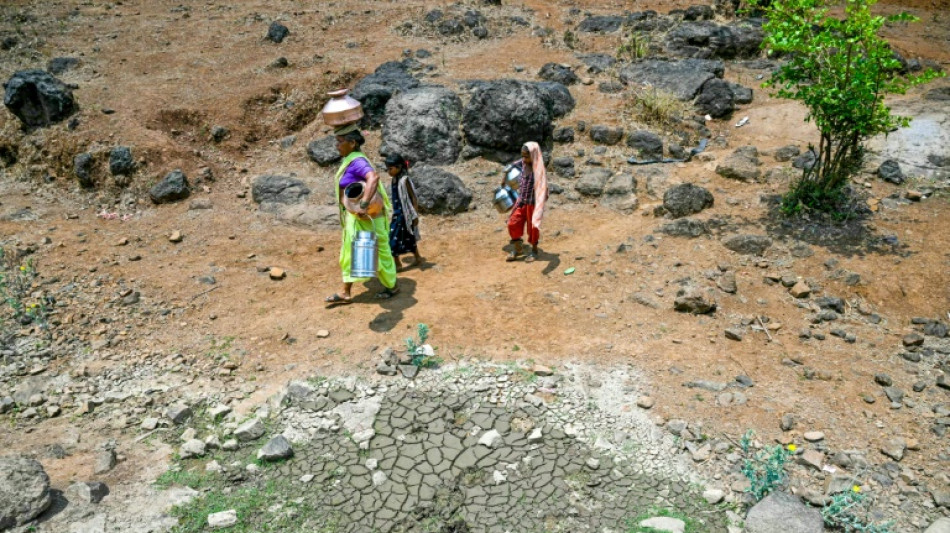
-
 Munsey leads Scotland to 207-4 against Italy at T20 World Cup
Munsey leads Scotland to 207-4 against Italy at T20 World Cup
-
Japan restarts world's biggest nuclear plant again

-
 Bangladesh poll rivals rally on final day of campaign
Bangladesh poll rivals rally on final day of campaign
-
Third impeachment case filed against Philippine VP Duterte

-
 Wallaby winger Nawaqanitawase heads to Japan
Wallaby winger Nawaqanitawase heads to Japan
-
Thailand's Anutin rides wave of nationalism to election victory

-
 Venezuela's Machado says ally kidnapped by armed men after his release
Venezuela's Machado says ally kidnapped by armed men after his release
-
Maye longs for do-over as record Super Bowl bid ends in misery

-
 Seahawks' Walker rushes to Super Bowl MVP honors
Seahawks' Walker rushes to Super Bowl MVP honors
-
Darnold basks in 'special journey' to Super Bowl glory

-
 Japan's Takaichi may struggle to soothe voters and markets
Japan's Takaichi may struggle to soothe voters and markets
-
Seahawks soar to Super Bowl win over Patriots

-
 'Want to go home': Indonesian crew abandoned off Africa demand wages
'Want to go home': Indonesian crew abandoned off Africa demand wages
-
Asian stocks track Wall St rally as Tokyo hits record on Takaichi win

-
 Bad Bunny celebrates Puerto Rico in joyous Super Bowl halftime show
Bad Bunny celebrates Puerto Rico in joyous Super Bowl halftime show
-
Three prominent opposition figures released in Venezuela

-
 Israeli president says 'we shall overcome this evil' at Bondi Beach
Israeli president says 'we shall overcome this evil' at Bondi Beach
-
'Flood' of disinformation ahead of Bangladesh election

-
 Arguments to begin in key US social media addiction trial
Arguments to begin in key US social media addiction trial
-
Agronomics Limited Announces Net Asset Value Calculation as at 31 December 2025

-
 UK-Based Vesalic Limited Emerges from Stealth with Landmark Discovery of Potential Non-CNS Driver of Motor Neuron Diseases, including ALS, and Breakthrough Therapeutic and Diagnostic Opportunities
UK-Based Vesalic Limited Emerges from Stealth with Landmark Discovery of Potential Non-CNS Driver of Motor Neuron Diseases, including ALS, and Breakthrough Therapeutic and Diagnostic Opportunities
-
Gotterup tops Matsuyama in playoff to win Phoenix Open

-
 New Zealand's Christchurch mosque killer appeals conviction
New Zealand's Christchurch mosque killer appeals conviction
-
Leonard's 41 leads Clippers over T-Wolves, Knicks cruise

-
 Trump says China's Xi to visit US 'toward the end of the year'
Trump says China's Xi to visit US 'toward the end of the year'
-
Real Madrid edge Valencia to stay on Barca's tail, Atletico slump

-
 Malinin keeps USA golden in Olympic figure skating team event
Malinin keeps USA golden in Olympic figure skating team event
-
Lebanon building collapse toll rises to 9: civil defence

-
 Real Madrid keep pressure on Barca with tight win at Valencia
Real Madrid keep pressure on Barca with tight win at Valencia
-
PSG trounce Marseille to move back top of Ligue 1

-
 Hong Kong to sentence media mogul Jimmy Lai in national security trial
Hong Kong to sentence media mogul Jimmy Lai in national security trial
-
Lillard will try to match record with third NBA 3-Point title

-
 Vonn breaks leg as crashes out in brutal end to Olympic dream
Vonn breaks leg as crashes out in brutal end to Olympic dream
-
Malinin enters the fray as Japan lead USA in Olympics team skating

-
 Thailand's Anutin readies for coalition talks after election win
Thailand's Anutin readies for coalition talks after election win
-
Fans arrive for Patriots-Seahawks Super Bowl as politics swirl

-
 'Send Help' repeats as N.America box office champ
'Send Help' repeats as N.America box office champ
-
Japan close gap on USA in Winter Olympics team skating event

-
 Liverpool improvement not reflected in results, says Slot
Liverpool improvement not reflected in results, says Slot
-
Japan PM Takaichi basks in election triumph

-
 Machado's close ally released in Venezuela
Machado's close ally released in Venezuela
-
Dimarco helps Inter to eight-point lead in Serie A

-
 Man City 'needed' to beat Liverpool to keep title race alive: Silva
Man City 'needed' to beat Liverpool to keep title race alive: Silva
-
Czech snowboarder Maderova lands shock Olympic parallel giant slalom win

-
 Man City fight back to end Anfield hoodoo and reel in Arsenal
Man City fight back to end Anfield hoodoo and reel in Arsenal
-
Diaz treble helps Bayern crush Hoffenheim and go six clear

-
 US astronaut to take her 3-year-old's cuddly rabbit into space
US astronaut to take her 3-year-old's cuddly rabbit into space
-
Israeli president to honour Bondi Beach attack victims on Australia visit

-
 Apologetic Turkish center Sengun replaces Shai as NBA All-Star
Apologetic Turkish center Sengun replaces Shai as NBA All-Star
-
Romania, Argentina leaders invited to Trump 'Board of Peace' meeting


Rural India runs dry as thirsty megacity Mumbai sucks water
Far from the gleaming high-rises of India's financial capital Mumbai, impoverished villages in areas supplying the megacity's water are running dry -- a crisis repeated across the country that experts say foreshadows terrifying problems.
"The people in Mumbai drink our water but no one there, including the government, pays attention to us or our demands," said Sunita Pandurang Satgir, carrying a heavy metal pot on her head filled with foul-smelling water.
Demand is increasing in the world's most populous nation of 1.4 billion people, but supplies are shrinking -- with climate change driving erratic rainfall and extreme heat.
Large-scale infrastructure for Mumbai includes reservoirs connected by canals and pipelines channelling water from 100 kilometres (60 miles) away.
But experts say a failure of basic planning means that the network is often not connected to hundreds of rural villages in the region and several nearby districts.
Instead, they rely on traditional wells.
But demand far outstrips meagre resources, and critical groundwater levels are falling.
"Our days and our lives just revolve around thinking about collecting water, collecting it once, and collecting it again, and again," Satgir said.
"We make four to six rounds for water every day... leaving us time for nothing else".
- Heatwaves and dry wells -
Climate change is shifting weather patterns, bringing longer-lasting and more intense droughts.
Wells rapidly run dry early in the extreme heat.
In the peak of summer, 35-year-old Satgir said she can spend up to six hours a day fetching water.
Temperatures this year surged above a brutal 45 degrees Celsius (113 Fahrenheit).
When the well dries, the village then relies on a government tanker with irregular supplies, two or three times a week.
It brings untreated water from a river where people wash and animals graze.
Satgir's home in the dusty village of Navinwadi, near the farming town of Shahapur, lies some 100 kilometres from the busy streets of Mumbai.
The area is also the source of major reservoirs supplying some 60 percent of water to Mumbai, local government authorities say.
Mumbai is India's second-biggest and rapidly expanding city, with an estimated population of 22 million.
"All that water from around us goes to the people in the big city and nothing has changed for us," Satgir said.
"Our three generations are linked to that one well," she added. "It is our only source."
Deputy village head Rupali Bhaskar Sadgir, 26, said residents were often sick from the water.
But it was their only option.
"We've been requesting governments for years to ensure that the water available at the dams also reaches us," she said. "But it just keeps getting worse."
Government authorities both at the state level and in New Delhi say they are committed to tackling the problem and have announced repeated schemes to address the water crisis.
But villagers say they have not reached them yet.
- 'Unsustainable rates' -
India's government-run NITI Aayog public policy centre forecasts a "steep fall of around 40 percent in freshwater availability by 2030", in a July 2023 report.
It also warned of "increasing water shortages, depleting groundwater tables and deteriorating resource quality".
Groundwater resources "are being depleted at unsustainable rates", it added, noting they make up some 40 percent of total water supplies.
It is a story repeated across India, said Himanshu Thakkar, from the South Asia Network on Dams, Rivers and People, a Delhi-based water rights campaign group.
This is "typical of what keeps happening all over the country", Thakkar said, adding it represents everything "wrong with the political economy of making dams in India".
"While projects are planned and justified in the name of drought-prone regions and its people, most end up serving only the distant urban areas and industries," he said.
Prime Minister Narendra Modi, who began a third term in office this month, announced a flagship scheme to provide tapped water to every household in 2019.
But in Navinwadi village, residents are resigned to living on the strictly rationed supply.
When the water tanker arrives, dozens of women and children sprint out with pots, pans, and buckets.
Santosh Trambakh Dhonner, 50, a daily labourer, said he joined the scramble as he had not found work that day.
"More hands means more water at home", he said.
Ganesh Waghe, 25, said residents had complained and protested, but nothing was done.
"We are not living with any grand ambitions," Waghe said. "Just a dream of water the next morning".
O.Norris--AMWN


